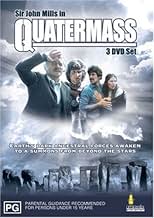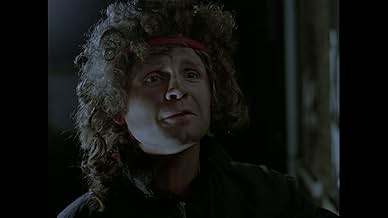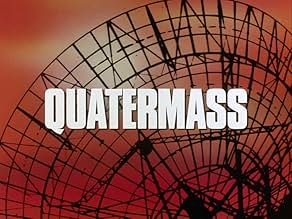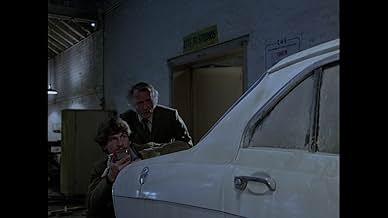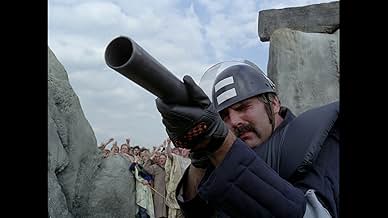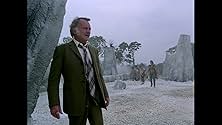Adicionar um enredo no seu idiomaIn the distant future, a now-elderly Bernard Quatermass investigates the disappearance of his granddaughter and a mysterious cult.In the distant future, a now-elderly Bernard Quatermass investigates the disappearance of his granddaughter and a mysterious cult.In the distant future, a now-elderly Bernard Quatermass investigates the disappearance of his granddaughter and a mysterious cult.
Explorar episódios
Avaliações em destaque
I recently watched the complete four-hour version of Nigel Kneale's British miniseries "Quatermass." I had seen an edited movie version called "The Quatermass Conclusion" some years earlier. The verdict: The miniseries is superior. It expands on several subplots (of course) and offers richer characterizations. John Mills makes an excellent Quatermass--somewhat befuddled at the outset, but strong and clear of mind when the survival of the world is at stake. Granted, the production is not as polished as the movie version of "Quatermass and the Pit" (the music, in particular, sounds like it costs a couple of hundred bucks). But the ideas are intriguing and that darn nursery rhyme about Ringstone Round is still running around my brain. Kneale wrote a novelization of the miniseries that clarifies a few vague points.
The Quatermass Conclusion deals with an alien machine returning to the Earth after five thousand years to 'harvest' and stir-up the glandular secretions of humans which it then uses for it's own ends. Set in a near-future (in the 70s when it was released), the scene is an anarchistic, broken-down and violent vision of Britain, but none of the little touches are over the top enough to be classed as impossible. Prince Charles is on the throne, cars have number plates with 'v' on them and the Metropolitain Police are now privately contracted. Street crime, muggings and overall disorder are all the people know (oh no, it's all coming true!!) When the alien presence is identified as a threat rather than a religious saviour in a chilling Nigel Kneale trademark 'revelation of terror': the body parts in the ashes at Ringstone Round, Quatermass is employed in his quite usual role of leading science against politicians and the military machine to engage the menace. This seems to perk him up a little, when we see him first he is an old man broken down by the anarchy of society, depressed also that his work with the rocket group ended up being misused only for military ends. This is a very bleak piece which would depress viewers if it wasn't so busy chilling and terrifying the hell out if them with trademark Nigel Kneale 'terror revelations' and extremely succinct scientific concepts and valid predictions. Not only that, but it lays claim to having the most chilling and atmospherically terrifying aspect of all of the Quatermass films and serials, the spine-tingling refrain of 'huffity-puffity Ringstone Round'. I always only ever thought there were three Quatermass serials, Xperiment, II and Pit, up until about 4 years ago, when a conversation in a pub about there being another where 'people were being drawn to Stonehenge to be eaten' put me on the trail of this, and the first time I managed to get to see it after this revelation my blood ran cold at that nursery rhyme. I had a shudder just then recalling it.
I remember seeing this broadcast. It was made by Euston Films so I was expecting th usual "Sweeney" type over-grain in the picture (1970's high speed 16mm), but instead it had the full gorgeous look of a motion picture, having been shot in 35mm with full motion picture negative (whereas most American productions were shot on 35mm television stock). The special effects where not all that good where the space shots were concerned - even by 1970's standards (to see good examples of these effects look at Space 1999 (1976 - 1978) whose Director of Effects, Brian Johnson, went on to win an Oscar just a couple of years later - for Alien). But the idea that a beam would come through space and consume vast number of people and turn them into a diaphanous web was effectively executed. It would be nice to see it again in its full version - perhaps the BBC could show it without breaks in two parts. Also it was an early appearance for Simon McQuorkindale (Manimal!).
You have to hand it to Nigel Kneale.... Even after all these years, his works still have the power to leave you feeling just a bit disturbed. Not in the out and out conventions of most horror/sci-fi titles, but with the underlying neuroses and paranoias that afflict all societies, regardless of culture.
All of the Quatermass serials contained these elements, so much so that they were practically strip-mined by The X Files. And so, regardless of the quaint anachronisms that they contain, they still, somehow, manage to retain something for the modern viewer.
The 1970's Quatermass series is the most anachronistic of all, because it is so unlike the earlier serials (produced in the 50's and 60's, as were the film versions of said series). This makes the aesthetic of the series so much more nihilistic. Made under the backdrop of the (then) rising punk scene, the random violence and criminal behaviour that is portrayed must have seemed entirely topical. Even the relative cheapness of the production adds to this aesthetic: so very 70's Brit sci-fi.
But the series was written back in the late 60's, originally intended to be the 4th film in the movie series (especially with the relative success of the "Quatermass and the Pit" film). This is why we have the strange interbreeding of hippy culture and guns....
As such, you have to say that Kneale was certainly visionary in that oh-so grim British way.... And the concept that human beings might be hardwired to seek out destructive (even genocidal) religious ideals (by unseen, advanced intelligences), capable of being intensified remotely for "harvesting" (for reasons unknown), certainly has a lot of resonance in today's world.
The acting in the series was variable (understandable for a TV series). John Mills is capable as the aging and (initially) confused Quatermass, desperately seeking his granddaughter in a world that seems to be falling apart. Once the threat is recognised, the scientist in him takes over, leading to a slow and tragic conclusion.
Simon McCorkindale, an actor who seemed to be on top of his game at this time, ably plays Quatermass's sidekick, Joe Kapp. Never the safest thing to be in any Quatermass serial, Kapp is taken through the emotional wringer in ways too horrible for a husband and father to bear, before facing the fate of sidekicks before him.
Bruce Purchase and David Yip provide temporary interest (never destined to be long-lived in a Quatermass serial).
On the flipside, Ralph Arliss is quite painful as the murderous (and annoying) Kickalong, whose fate is far too kind (and long in waiting). There is an earlier scene where a group of the planet people are massacred whilst walking between rival gangs having a shootout. Something like that would have been more appropriate for Kickalong, but it was, sadly, not to be....
The effects are of a pretty low standard, but given everything else, this doesn't really seem to matter. Given the cheap, 70's budget the producers had to work with (we certainly aren't looking at a Space: 1999 cashflow here), they managed to perform miracles.
I remember first watching this some time in the 80's (I'm not sure when precisely) on late-night TV. The darkly-nihilistic atmosphere of the series attracted me to it, then, because it was so different to other sci-fi shows going around. Years later I still find it strangely appealing, even with the faults of its age.
All of the Quatermass serials contained these elements, so much so that they were practically strip-mined by The X Files. And so, regardless of the quaint anachronisms that they contain, they still, somehow, manage to retain something for the modern viewer.
The 1970's Quatermass series is the most anachronistic of all, because it is so unlike the earlier serials (produced in the 50's and 60's, as were the film versions of said series). This makes the aesthetic of the series so much more nihilistic. Made under the backdrop of the (then) rising punk scene, the random violence and criminal behaviour that is portrayed must have seemed entirely topical. Even the relative cheapness of the production adds to this aesthetic: so very 70's Brit sci-fi.
But the series was written back in the late 60's, originally intended to be the 4th film in the movie series (especially with the relative success of the "Quatermass and the Pit" film). This is why we have the strange interbreeding of hippy culture and guns....
As such, you have to say that Kneale was certainly visionary in that oh-so grim British way.... And the concept that human beings might be hardwired to seek out destructive (even genocidal) religious ideals (by unseen, advanced intelligences), capable of being intensified remotely for "harvesting" (for reasons unknown), certainly has a lot of resonance in today's world.
The acting in the series was variable (understandable for a TV series). John Mills is capable as the aging and (initially) confused Quatermass, desperately seeking his granddaughter in a world that seems to be falling apart. Once the threat is recognised, the scientist in him takes over, leading to a slow and tragic conclusion.
Simon McCorkindale, an actor who seemed to be on top of his game at this time, ably plays Quatermass's sidekick, Joe Kapp. Never the safest thing to be in any Quatermass serial, Kapp is taken through the emotional wringer in ways too horrible for a husband and father to bear, before facing the fate of sidekicks before him.
Bruce Purchase and David Yip provide temporary interest (never destined to be long-lived in a Quatermass serial).
On the flipside, Ralph Arliss is quite painful as the murderous (and annoying) Kickalong, whose fate is far too kind (and long in waiting). There is an earlier scene where a group of the planet people are massacred whilst walking between rival gangs having a shootout. Something like that would have been more appropriate for Kickalong, but it was, sadly, not to be....
The effects are of a pretty low standard, but given everything else, this doesn't really seem to matter. Given the cheap, 70's budget the producers had to work with (we certainly aren't looking at a Space: 1999 cashflow here), they managed to perform miracles.
I remember first watching this some time in the 80's (I'm not sure when precisely) on late-night TV. The darkly-nihilistic atmosphere of the series attracted me to it, then, because it was so different to other sci-fi shows going around. Years later I still find it strangely appealing, even with the faults of its age.
I saw this series when first aired, when I was just a kid, and while I remembered little about the story, I did remember that it made more of an impression on me than most SF shows of the time. Now I can see why.
The setting is very much 'future 70s', with hippies, oil restrictions, social collapse, power cuts, and other fears of that era, the effects are certainly very old by modern standards, and Mills' Quatermass is too undeveloped and unsympathetic for my tastes. However, the story makes up for it, and there are some memorable ideas (like gladiatorial games in Wembley Stadium) and some memorable scenes (again, the Wembley Stadium 'harvesting' scene in particular, and the S&M 'family show' would also have been a lot more fun on Saturday night TV than Noel Edmonds).
One thing I hate about bad SF is that the aliens are just people with a few rubber bits stuck on their face, who come to Earth to kidnap women or steal our resources, or some other mundane and, frankly, very human goal. Quatermass' aliens, on the other hand, are never seen and we never even really find out quite what they're doing, just that they're extremely powerful and don't care about humans in the least... it's a far more intelligent premise, and very Lovecraftian, in a way.
So, the effects are dated, Quatermass himself could have done with more work and possibly a different actor, but overall it's an intelligent premise, and, frankly, the idea of an attack by hugely powerful aliens who care nothing for the human race is far more scary to me than most so-called 'horror' movies of recent years.
The setting is very much 'future 70s', with hippies, oil restrictions, social collapse, power cuts, and other fears of that era, the effects are certainly very old by modern standards, and Mills' Quatermass is too undeveloped and unsympathetic for my tastes. However, the story makes up for it, and there are some memorable ideas (like gladiatorial games in Wembley Stadium) and some memorable scenes (again, the Wembley Stadium 'harvesting' scene in particular, and the S&M 'family show' would also have been a lot more fun on Saturday night TV than Noel Edmonds).
One thing I hate about bad SF is that the aliens are just people with a few rubber bits stuck on their face, who come to Earth to kidnap women or steal our resources, or some other mundane and, frankly, very human goal. Quatermass' aliens, on the other hand, are never seen and we never even really find out quite what they're doing, just that they're extremely powerful and don't care about humans in the least... it's a far more intelligent premise, and very Lovecraftian, in a way.
So, the effects are dated, Quatermass himself could have done with more work and possibly a different actor, but overall it's an intelligent premise, and, frankly, the idea of an attack by hugely powerful aliens who care nothing for the human race is far more scary to me than most so-called 'horror' movies of recent years.
Você sabia?
- CuriosidadesStarted life in 1973 as a BBC series called "Quatermass IV". It had been commissioned by Head of Drama Ronald Marsh, and according to Nigel Kneale, the intended producer was Joe Waters. Some model test sequences of the space station were shot, but eventually, the project was abandoned by the BBC. ITV then picked it up a few years later and produced it in association with Euston Films.
- Versões alternativasThis has been made available in the United States in two versions. It was first released edited down to a 105 minute feature film under the title The Quatermass Conclusion (1979). In 2003 the complete program was released on home video under the title "Quatermass" with a listed running time of 240 minutes.
- ConexõesEdited into The Quatermass Conclusion (1979)
Principais escolhas
Faça login para avaliar e ver a lista de recomendações personalizadas
- How many seasons does Quatermass have?Fornecido pela Alexa
Detalhes
Contribua para esta página
Sugerir uma alteração ou adicionar conteúdo ausente

